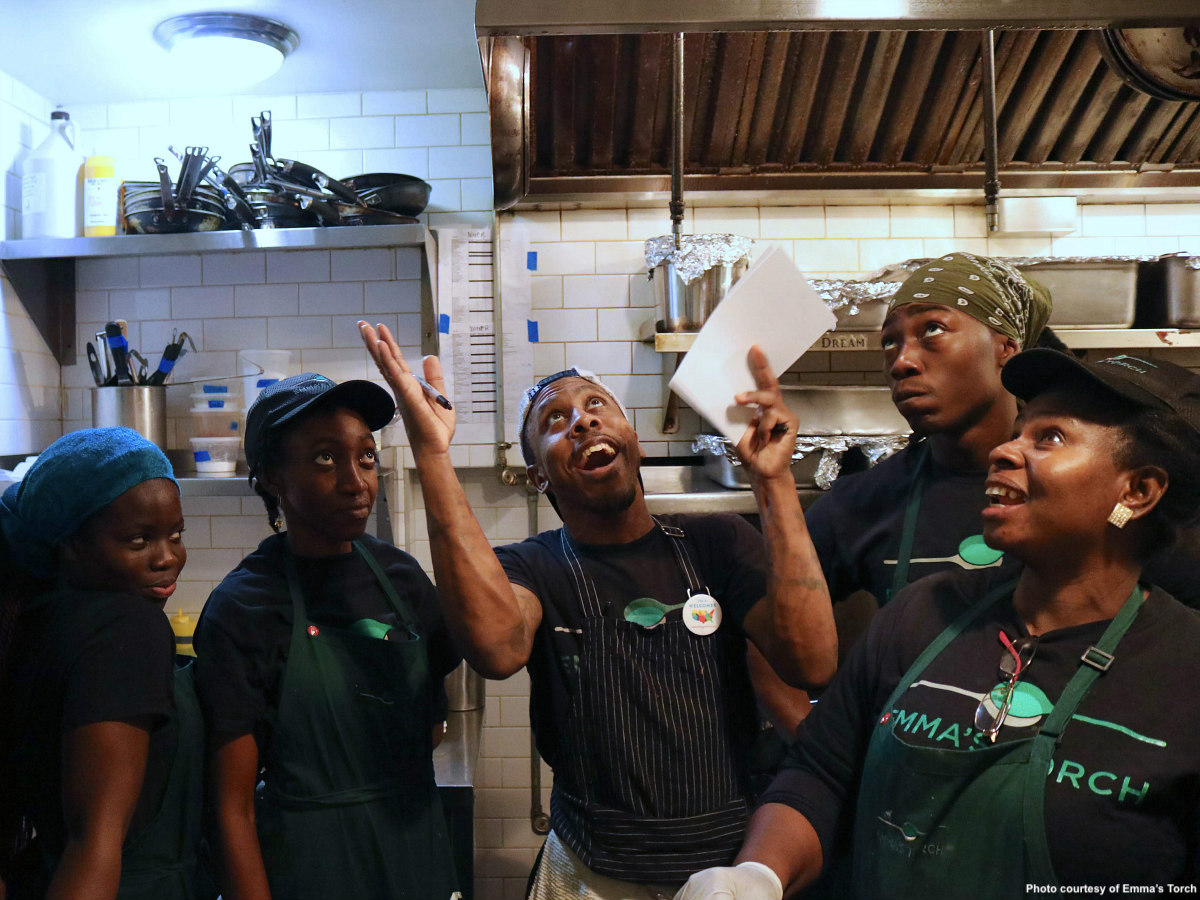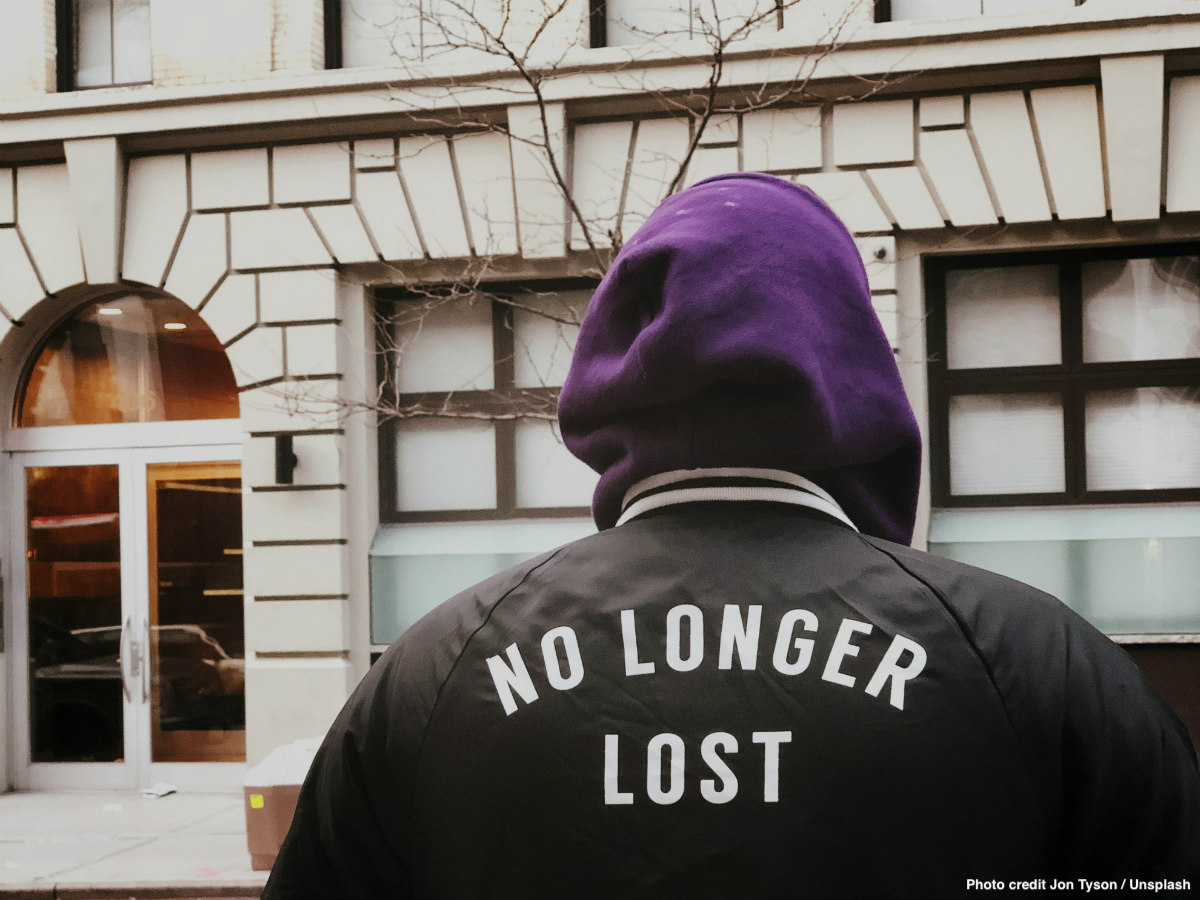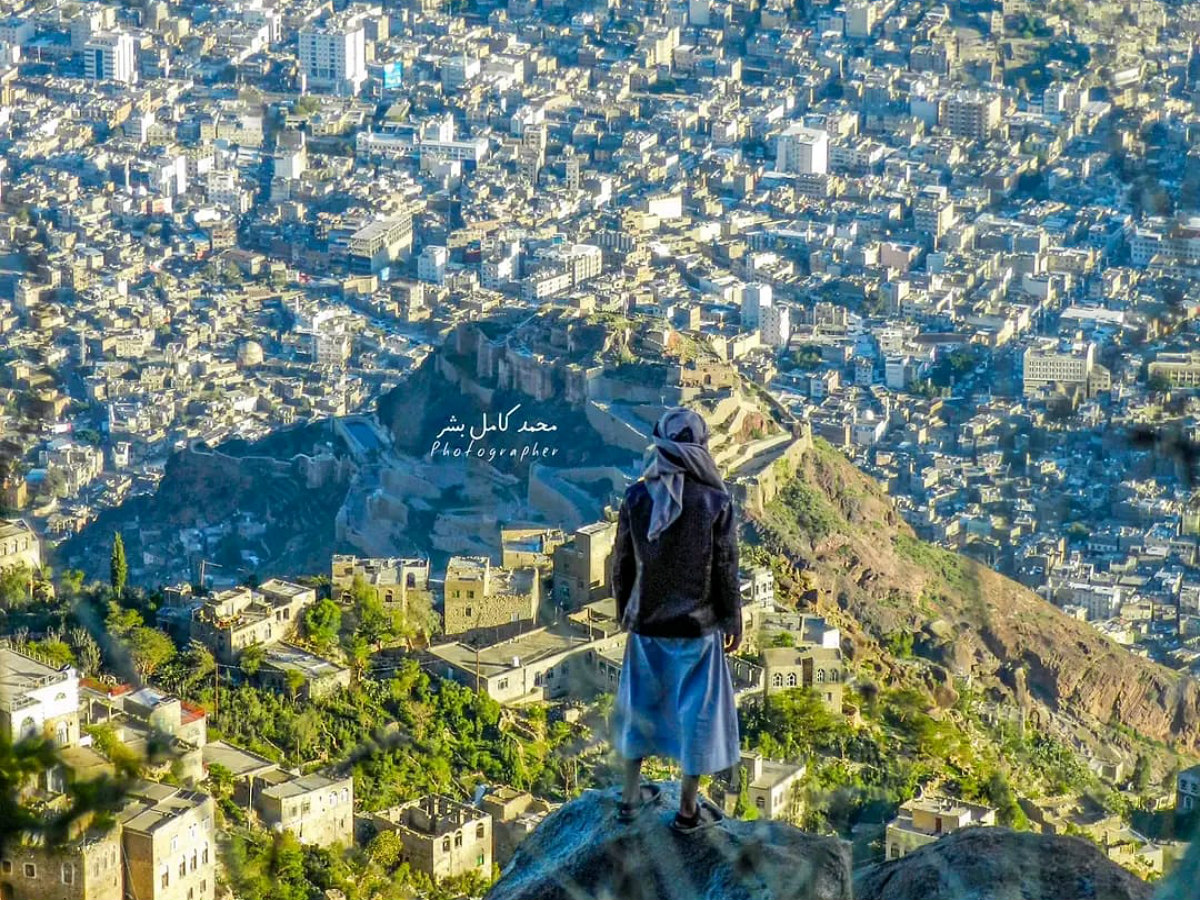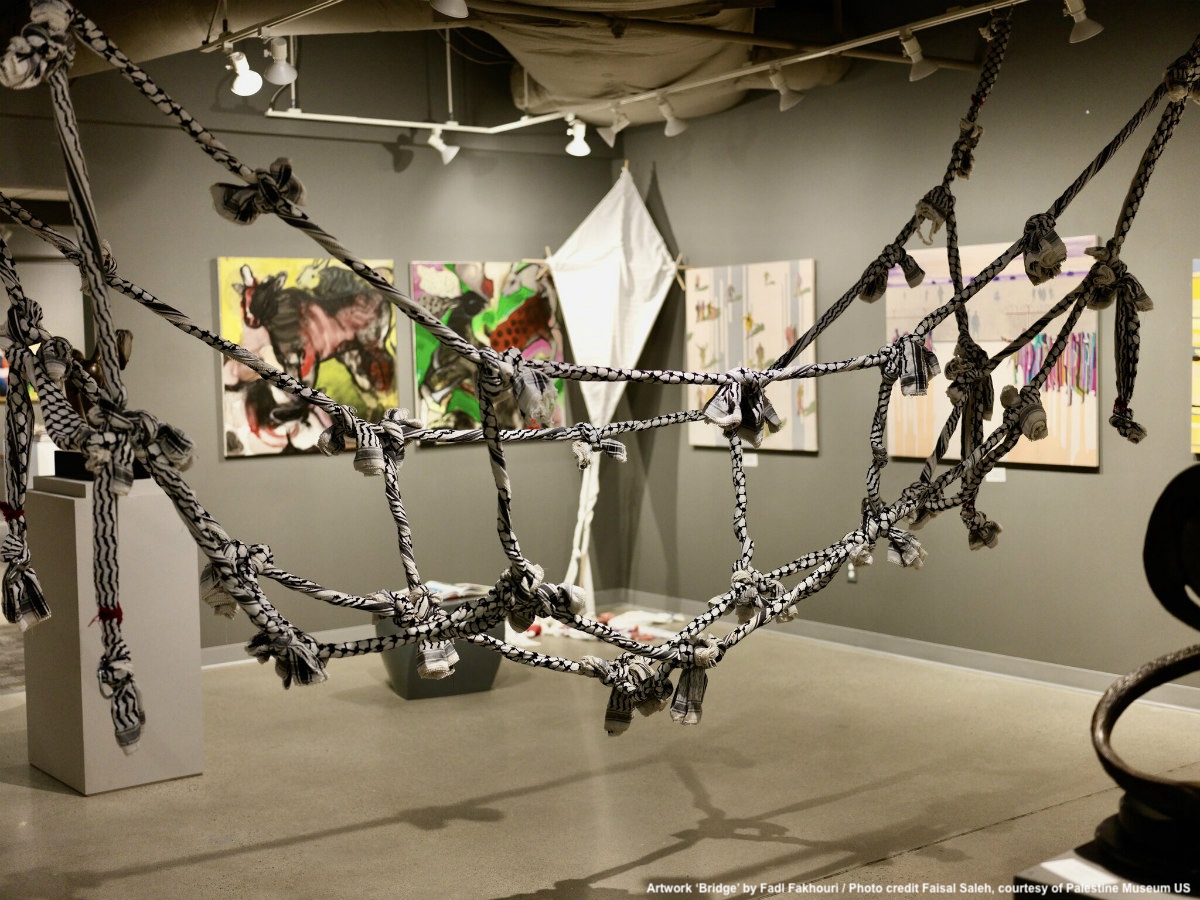If you are looking for a meaningful taste of vibrant food culture in Brooklyn, I strongly suggest visiting Emma’s Torch. Its storefront exterior melds into the tapestry of the city; yet, upon entry, one is instantly aware that they have stumbled upon something distinct and special. Warm, welcoming smiles greet the peaceful atmosphere, and tasty beverages and foods grace the menu, including several vegetarian, vegan and gluten-free options. More importantly, there is another reason to frequent Emma’s Torch, where one’s purchase is going to an important cause, as New York continues to grapple with the migrant crisis.
In April, I visited the Emma’s Torch location in the Carroll Gardens neighborhood of Brooklyn. At that time, an influx of asylum seekers were arriving in New York City, and heartbreakingly, the migrant crisis continues, in fact, it has escalated, with insufficient accommodations for people who flee violence and conflicts and just want a chance to live their lives. Many volunteers are doing mutual aid work to help, as the city is overwhelmed with this migrant crisis — both the regular shelters and emergency-housing system are at capacity in New York.
When I spoke with Kerry Brodie, the founder and executive director of Emma’s Torch, she described what her organization has been doing to support and empower asylees. Originally she founded Emma’s Torch in the neighborhood of Red Hook, in Brooklyn, in 2006. Her vision was to support those entering the United States who were seeking asylum, and it has continued to grow ever since. So far, she has opened three cafés in New York and one in Washington DC.
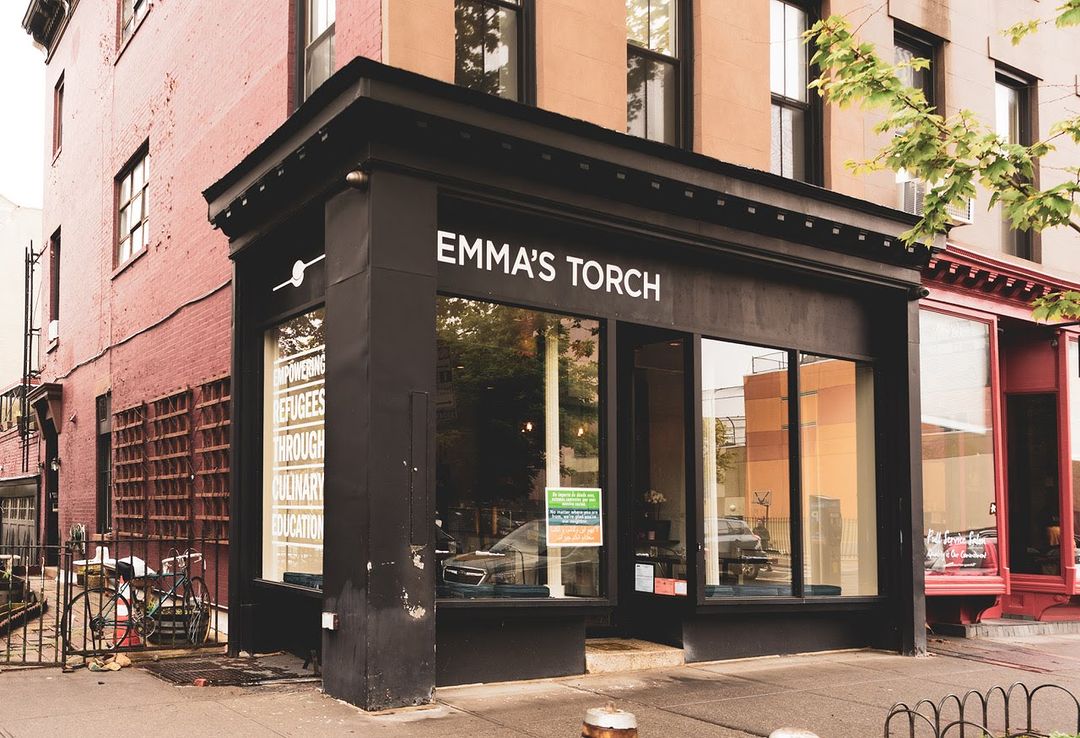
What started as a two-day-a-week culinary arts training initiative has progressively expanded into a full-time endeavor empowering refugees, beyond their culinary aspirations. The Emma’s Torch program consists of an eleven week apprenticeship, offering up to four hundred hours of training in the culinary arts. Upon completion of the program, graduates are connected with employment opportunities through partnerships in the food and beverage industry, in consultation with their culinary council. By providing people with training, tools, and support, an effective network is put in place to forge successful paths that can lead to positive futures.
Brodie explained that, in addition to culinary studies, the organization offers other educational aspects and life skills, such as the Employability, Equity and Empowerment Training. And she adds, “We talk about empowerment more than anything else, because it’s not just about ‘how do you get this job, but how do you build the life that you want here? How do you feel confident, safe, and whole in what you are doing? That has been a very key contributor in not just the success of our students in finding jobs, but also in building those lives.”
While closed for six months during the pandemic, Emma’s Torch had to temporarily halt culinary classes. During this period, it wisely utilized the time by conducting important educational classes over Zoom, that helped students get acclimated and taught them how to navigate complex bureaucratic systems such as filing for unemployment and other benefits. They also offered know-your-rights education, and professional development courses that included help with writing cover letters and job applications, and English classes. Brodie recalls that “Those classes were really powerful and gave people hope that we are going to get through this together, and that there will be opportunities on the other side.”
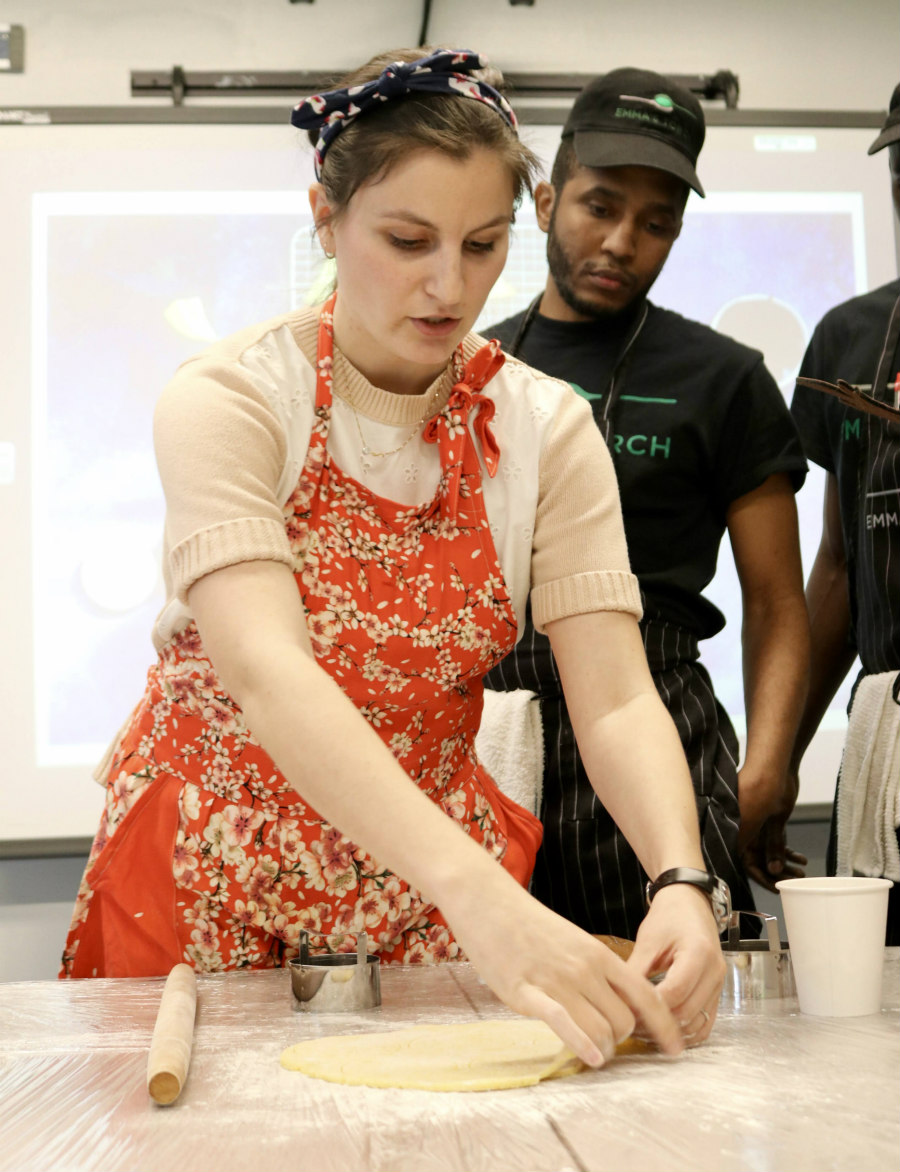
“During the pandemic, we realized that we needed to build out more community between our students, and it was really beautiful to see. We offered all of these classes over Zoom for all of the alumni, regardless of when they graduated, and people really built relationships. It means something: you were at Emma’s Torch, I was at Emma’s Torch, we might not have known each other there, but now we will work together. We see that whenever we place students in a restaurant that already has another Emma’s Torch graduate working there. It can be really empowering to have someone who comes up and can train them. We have seen that with different restaurant partnerships, where we place one student, and then a year later, somebody else will be reporting to that student from our cohorts. We do hope over time that when our graduates open businesses, that they will also hire alumni. That would be really special as well.”
Brodie’s inspiration for this endeavor began as a child. Inspired by her grandmother, a former event planner and caterer, Brodie combined her life-long affinity for cooking with her work in the global and human rights sectors, and this melding of her passions led to the important endeavor that is Emma’s Torch.
We have been really heartened to see that there has been a big push and a lot of activism around getting worker’s authorization more quickly for individuals who are arriving. One of those leading voices has been the culinary industry, the restaurant community, and a lot of our employment partners.
The organization’s namesake, Emma Lazarus, was a Jewish poet and activist dedicated to helping incoming immigrants to the United States in the 19th century. Her advocacy and activism were particularly notable in respect to pro-immigration and the Women’s Suffrage movement. The conviction was so deep, in fact, that some of her poetry is intertwined with what has become the epitome of immigrating to the United States. Emma Lazarus penned the iconic sonnet, “The New Colossus,” where it is engraved on a bronze plaque on the pedestal of the Statue of Liberty. Placed on the statue posthumously in 1903, it is a sentiment and a reality still so poignant and relevant today. The entire poem, written by Lazarus in 1883, is as follows:
The New Colossus
Not like the brazen giant of Greek fame,
With conquering limbs astride from land to land;
Here at our sea-washed, sunset gates shall stand
A mighty woman with a torch, whose flame
Is the imprisoned lightning, and her name
Mother of Exiles. From her beacon-hand
Glows world-wide welcome; her mild eyes command
The air-bridged harbor that twin cities frame.
“Keep, ancient lands, your storied pomp!” cries she
With silent lips. “Give me your tired, your poor,
Your huddled masses yearning to breathe free,
The wretched refuse of your teeming shore.
Send these, the homeless, tempest-tost to me,
I lift my lamp beside the golden door!”
As Lazarus’ volunteer work and poignant words embraced immigrants from across the world, Emma’s Torch today continues this vision by welcoming and offering opportunity within the culinary arts as a means of making a new life in this country.
When asked if there are any fond memories that come to mind throughout the seven years that Emma’s Torch has been operating, Brodie recalls: “We’ve worked with three hundred students at this point, so there are three hundred stories, and each of our students are each so special and so unique. One of them that I’m really proud of and that I’ve been recently reflecting on is one of our first students. He came to the United States from Syria, and he didn’t apply to the program – his sister, as a birthday present to him, signed him up for our program, to be one of our very first students. It was so much fun to work with him and to watch him grow, and he always said that one day he would open his own restaurant. A few months ago, he did just that.”
“So he and his brother-in-law opened an amazing restaurant called SYKO, which is a Korean-Syrian fusion restaurant, in Brooklyn. Just watching him shine, and knowing that, not just for him, but for his sister, for his family, what that means. And what that means for all the people that they are then able to employ. It brings me so much hope and so much joy.”
Brodie also spoke of how the poem Emma Lazarus wrote for the Statue of Liberty was intended to raise money for the statue’s pedestal. She described how it was a big undertaking throughout the United States, put together in small increments. Emma Lazarus initially said no, but then was approached again, and was asked if she would write about it from the viewpoint of her volunteer work with refugees coming to America. Brodie explains: “These are the values that incubated this poem, to identify what the welcoming point of the United States is; to ask ourselves, ‘What does it mean to be Liberty? Then she (Emma Lazarus) wrote a poem about what our strongest value is, which is the ability to uphold a stranger. I always found that to be really compelling and motivating. She lived at a time where the refugee crisis looked different than it does today, but was still prominent and she helped to make everybody feel connected to that, and I think that’s why her words were ultimately chosen to be on the statue.”
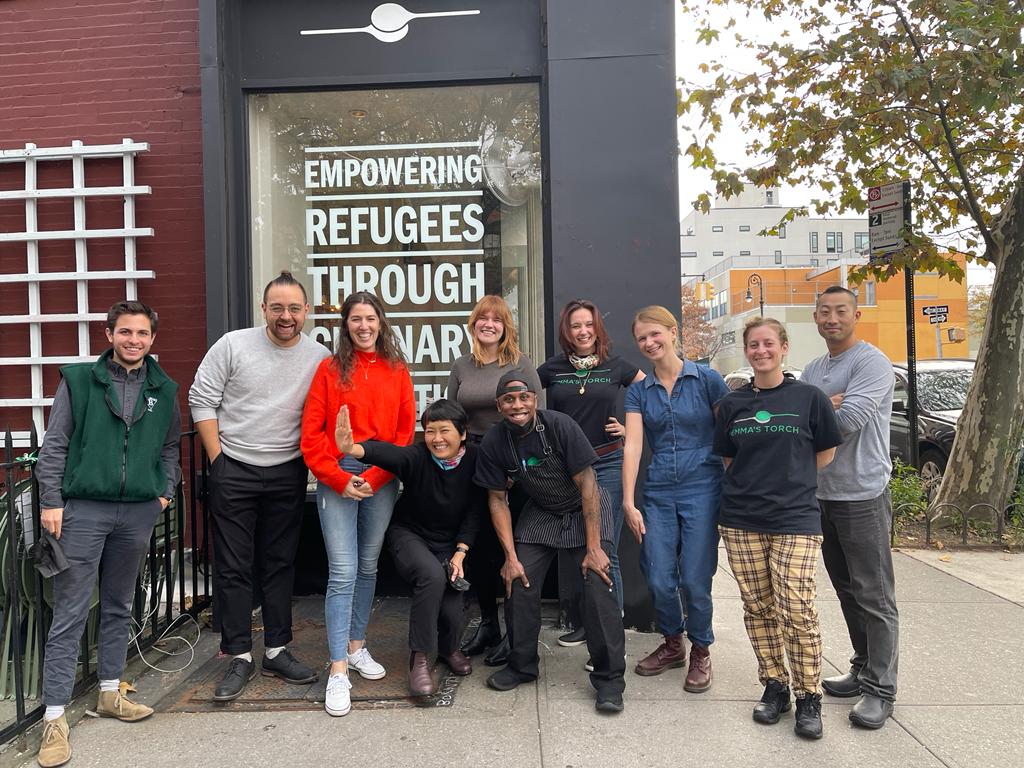
According to the Statue of Liberty’s official website, over twelve million people have come to America through Ellis Island in New York, and with the current crisis and urgent need for every migrant to find a safe place, Emma Lazarus’ immortalized words resonate just as meaningfully now as they did then. The migrant crisis continues to evolve, Brodie says, and it has gotten far worse in New York.
“Just the sheer number of waves of crises that have contributed to people being forced to migrate; trying to come to this country to build new lives, and recognizing that as that story continues forward, we have to do more, to serve more, and to meet people’s needs where they are, instead of being restrictive about what we believe those needs are. We can be looking at our students and see how to best serve them, as opposed to looking at what’s happening in the world, and how we react to these unprecedented times. While there are still challenges, we really do keep at the heart of our choices what is going to best prepare our students for the workforce, and for upward mobility. That’s driven our curricular changes over time, and we’ve been really fortunate to have been successful over time.”
When asked how Emma’s Torch is acclimating to continue its support post-pandemic and amidst the persistent migrant crisis in New York, Brodie’s impassioned dedication is evident. She explains, “Emma’s Torch is a fully paid opportunity, which makes it incredibly valuable, and we’ve made more shifts so we can onboard more students. We want to provide for more people, we want to make sure people know there are opportunities available. The flipside is that we are only allowed to enroll people who have workforce authorization; and we have been really heartened to see that there has been a big push and a lot of activism around getting worker’s authorization more quickly for individuals who are arriving. One of those leading voices has been the culinary industry, the restaurant community, and a lot of our employment partners. So it’s been really heartening to think about not just the work that we do on an individual basis, but the fact that as a community, we can recognize the power and value that we can provide.”
With Gratitude to Kerry Brodie and Emma’s Torch for this interview, and the important work that they continue to do.
Check Emma’s Torch opening hours and locations here.
